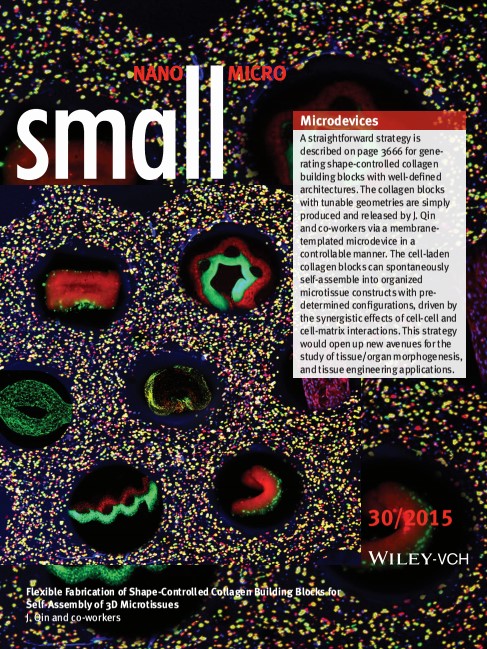Recently, the DICP Research Group led by Prof. Jianhua Qin has made progress on flexible fabrication of shape-controlled collagen building blocks for self-assembly of 3D microtissues based on microfluidic technique. The results were recently published on Small (DOI: 10.1002/smll.201500556) as Frontispiece, which were also highlighted by Materials View China
Scaffold material is one of the three major elements in tissue engineering. The biocompatibility of material design and preparation has been paid attention. With the rapid development of biological material, depending on the materials properties and cell type, scientists can fabricate various "cell-scaffold" blocks and use them as a basic unit in complex bionic organization building and engineering application. Collagen is a naturally occurring protein that constitutes a major part of the fibrillar extracellular matrix (ECM) in vivo, which can create simulative functioning tissue and provide a physiologically relevant microenvironment for cells. However, due to the fragility and weak mechanical strength of collagen, it is a big challenge to manipulate cell-laden collagen as a building block or to form a collagen block with a well-defined structure by using conventional method, thus limiting its applicability in the exploration of mechanism of tissue growth and tissue reconstitution.
In this research, a novel and straightforward strategy has been presented for generating shape-controlled collagen building blocks with well-defined architecture via a membrane-templated microdevice. This approach allows the collagen blocks to self-assemble into 3D tissue-like constructs with spatially distributions of cell types and functions. We describe the spontaneous self-assembly of cell-laden collagen blocks into tubular structure with predetermined configurations at tissue level, a process that is driven by the synergistic effects of cell–cell and cell–matrix interactions. These results open new possibilities for in vitro tissue models for organogenesis studies and tissue engineering applications.

New Progress in Collagen Building Blocks for Self-Assembly with Microfluidic Devices